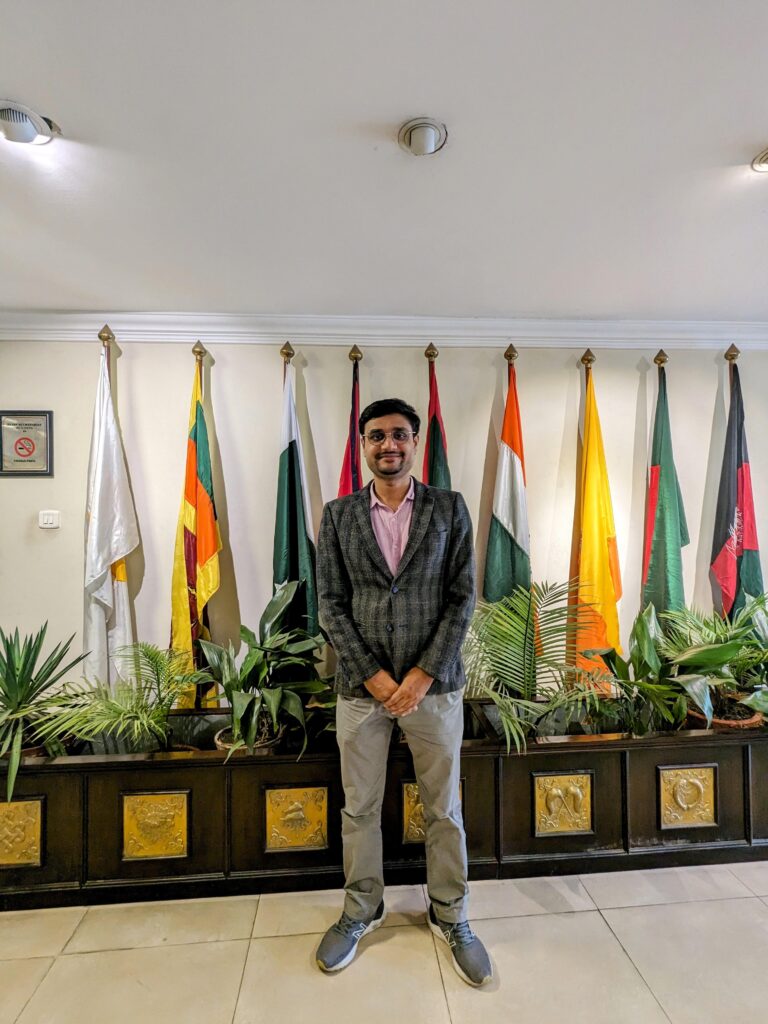
Nimesh Oli – MIA Class of 2024
1. Where and with whom did you intern?
I interned at the Secretariat of the South Asian Association for Regional Cooperation (SAARC) in Kathmandu, Nepal. I worked with the Director of Energy, Transportation, Science and Technology under the supervision of Tanveer Ahmed.
2. What were your primary responsibilities?
I conducted research under the supervision of my director for a report on Regional Integration in South Asia and how the region can leverage trade in advancing regionalism. Most of the countries in South Asia have more connections and trade with the outside world than the countries in the region. Because of this, people in the region are not getting the full benefits of regional cooperation and trade. I was conducting a thorough analysis of the issues with South Asian Regionalism, looking not only at colonial history but also at the developments that followed. I also compared why regional organizations like the Association of Southeast Asian Nations (ASEAN) and the European Union (EU) have been phenomenally successful while SAARC has not progressed. At the very end, I proposed a model for regional integration in South Asia through international trade as a prefatory vehicle for long-term integration.
3. Which of your previous classes or learning experiences were most useful to you during the internship?
While all of my Bush School experiences and classes were important learning avenues for me, the most useful classes during my internship were The Global Economy by Prof. Robertson and State Building and Failure in the Developing World by Prof. Huang. Similarly, my Quantitative Analysis I class with Prof. Dvir and the International Organizations class with Prof. Hamie were also helpful during my internship at SAARC. At the Bush School, I gained networking and communication skills and had the opportunity to meet and work with people of different nationalities and diverse backgrounds; this experience was very helpful during my internship.
4. What were the highlights or most important learning opportunities from your internship experience?
Most importantly, I got to meet with people from different South Asian countries working together for a common cause of regional integration. I got an opportunity to research the region’s history, how the regional integration panned out over the years, and why the process ground to a halt. I also had the opportunity to meet with other interns from the region who shared an optimistic view despite zero progress in regional integration in the last decade. Although I worked under a director who dealt with Energy, Transportation, Science and Technology, I had the flexibility to work and conduct research not limited to the director’s field. Because of the flexibility, I got to use my acquired knowledge and skills from the Bush School to write my final research report at SAARC, which mainly focused on the barriers and challenges to regionalism and how they can be addressed. Additionally, I got to travel to Bangladesh and witnessed the immense economic progress, the success in poverty reduction, and women’s empowerment, among others. I also got the opportunity to observe the Rohingya refugees in Kutupalong, Cox’s Bazar, Bangladesh. I witnessed their appalling living conditions and learned about their resettlement in third countries, especially in the West.
5. Do you have any advice for first-year Bush School students who may be applying for an internship for this summer?
The biggest piece of advice would be never to lose hope and apply for as many internships as possible from the very beginning. Reach out to your fellow students and professors if they have any ideas or connections for scholarships domestically or internationally. Additionally, reach out to Career Services administrators and staff for any help you need, as they are super helpful. At some point in time, you may be discouraged and stressed about not getting an internship or something you do not like, but the key thing here is to stay in the game. You will find something you like at the very end, no matter what. Still, you should be fully responsible for doing your part of the application process, like writing a good cover letter, updating your resume, and talking with your professors for reference, among other things.
